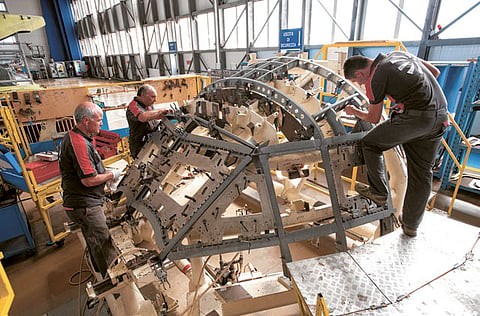Eurozone industrial orders confirm recovery
Near-term outlook promising but 2011 performance crucial

Brussels: New industrial orders in the Eurozone rose more than expected in November, data showed yesterday, confirming the strength of Eurozone recovery in industry but pointing to weakness in demand for consumer goods.
The European Union's statistics office, Eurostat, said industrial new orders in the 16 countries using the euro in November rose 2.1 per cent month-on-month against October, for a 19.9 per cent year-on-year gain.
Economists polled by Reuters had expected a 2.0 per cent monthly increase and a 17.1 per cent annual rise.
"This confirms the strength of the economic recovery in the Eurozone," said Dominique Barbet, senior economist at BNP Paribas.
Without the volatile orders for ships, planes and trains, industrial orders rose 2.1 per cent on the month and were 19.6 per cent higher than a year earlier.
Household demand
But while demand for capital and intermediate goods was strong, orders for durable consumer goods fell 0.9 per cent month-on-month and non-durable consumer goods orders were down 1.5 per cent, pointing to a weakness in household demand.
"The breakdown of orders, with weakness for consumer goods, also illustrates that recovery is still primarily driven by the manufacturing sector and exports in particular, thanks to the impressive German performance," Barbet said.
"The recovery is not yet broad-based, either on a geographical or product distribution, which could be a source of fragility over the medium term," he said.
Industrial new orders translate into industrial production, which is the key component of gross domestic product (GDP) growth.
Eurozone GDP rose 0.4 per cent in the third quarter against the previous three months, after a one per cent expansion in the second quarter, and some economists expect growth may be 0.4-0.5 per cent for the last three months of 2010.
"Robust orders in November following on from the upbeat manufacturing purchasing survey for January indicates that the near-term outlook for the Eurozone industrial production is very promising," said Howard Archer, economist at IHS Global Insight.
He noted, however, that inventory rebuilding in the Eurozone, which had helped orders in past months, could well be drawing to a close while domestic demand was likely to be increasingly limited by tighter fiscal policy.
"Eurozone manufacturers will be hoping, therefore, that global growth holds up well in 2011 and that the euro trades at a relatively competitive level," Archer said.
Economy in serious state
Swiss Economy Minister Johann Schneider-Ammann said the country's economy is in a ‘serious' situation as the European fiscal crisis pushes up the Swiss franc against the euro. "We're not in a crisis but the situation is serious," Schneider-Ammann said at a press conference in Bern yesterday. "Our European neighbours are struggling to breathe. We certainly don't remain unaffected."



